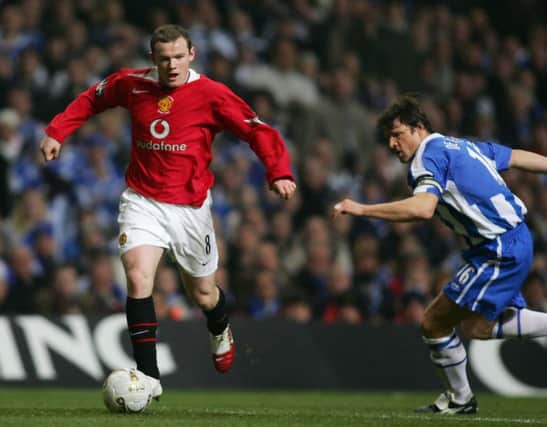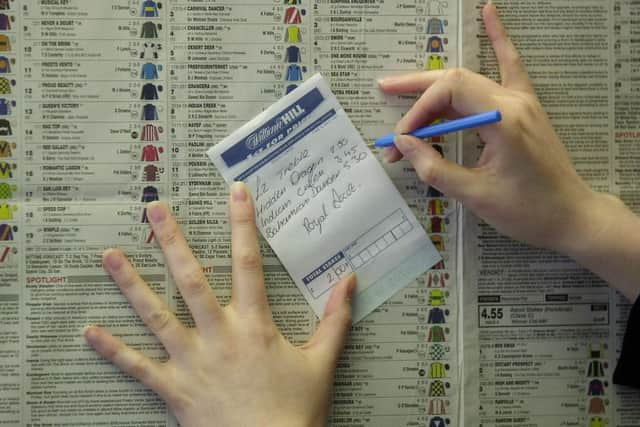Martyn McLaughlin: New ‘help’ for gambling addicts


WAYNE Rooney’s right foot means I can never be moralistic about gambling. With one graceless scuff in the six-yard box, his third goal for Manchester United in the 2006 Carling Cup final earned me the best part of £500 on a pocketful of loose change. As a novice’s wager, the scorecast bounty elicited a colourful reproach from the inveterate punters in my local, a tribe whose weekly ritual involves scrutinising the Saturday coupon with the fastidiousness of philology doctorates gathered around the Book of Kells.
The money, I seem to recall, was frittered as nonchalantly as it was won, but the most profitable outcome from that day was the realisation that my good fortune was fleeting. Others in my local are not so prosperous as to be able to enjoy the odd flutter socially. In the long, fallow weeks of the close season, one has taken to staking three-figure sums on online virtual tennis matches.
Advertisement
Hide AdAdvertisement
Hide AdAnother claims to be close to devising a foolproof system to beat the croupier algorithm behind games of computerised roulette on fixed odds betting terminals (Fibots). Luck lends them hope in return for a steep deposit – the latter machines accept stakes of up to £100 and Scots lose around £160 million to them annually.


In the nook of Glasgow’s southside where I live, there is no greengrocer or butcher within walking distance, nor is there a shortage of bookmakers happy to indulge the hopeless and the hard-up. Citywide, their deleterious presence has colonised high streets to the extent there are now 243 betting shops; in Birmingham, home to half a million more people, the number is 186. Their prevalence is even more acute in those impoverished postcodes where the “Glasgow Effect” is at its most ruinous. In Shettleston Road or Duke Street or Baillieston’s Main Street, the streetscapes are pocked with major chains such as Ladbrokes, William Hill, Coral and Betfred, their storefronts often buttressed by payday loan firms only too happy to accommodate the desperate in their darkest hour.
Yet, we are told, help is at hand. Yesterday saw the launch of a new confidential helpline allowing problem gamblers in Glasgow to request to be refused service at any of 36 participating betting shops in the city centre. While existing schemes have allowed people to be excluded from one bookie at a time, the new pilot permits them to debar themselves from dozens of premises simultaneously.
The launch was widely heralded in the press as a “pioneering” initiative which promises to “break new ground”. In theory, it is hard to dispute the merits of a scheme designed to counter a crippling addiction blighting the lives of more than 30,000 Scots; in practice, its influence will be negligible.
In a welter of statistics buried away in the boondocks of the website of the Gambling Commission – the government regulatory body for casinos, bingo clubs and gaming machines – the inexpedience of the self-exclusion tactic is laid bare. In the space of just a few years, there has been an alarming jump in the number of known breaches by customers who signed up for such schemes, only to discover their best intentions are a less persuasive influence than the lure of old habits.
In 2008-9, there were 4,033 breaches of self-exclusion agreements. Fast forward half a decade and the figure increased more than fivefold, with 21,002 breaches in 2013-14. The data detailing the number of people who cancelled their self-exclusion after the minimum six month period is just as worrying, with 5,802 individuals doing so in the year ending last September, compared with 1,160 in 2008-9.
The bookies, masters at getting something for nothing, know fine well how self-exclusion is an ineffective mechanism and their claims to the contrary should not be misconstrued as evidence of a new-found social conscience. This is an industry worth £7.1 billion a year, with powerful lobbyists close to those in power, yet it devotes a mere 0.01 per cent of its revenues via a voluntary levy to research, education and treatment programmes for those caught in its grip.
The initiative in Glasgow is the latest example of it paying lip service to the notion of corporate responsibility. Nowhere in the press coverage of the multi-operator exclusion scheme was there a mention of the source of the story – a press release from the Association of British Bookmakers. In it, the only line worth remembering is a quote by that organisation’s chief executive, Malcolm George. “This is,” he said, “a very important step towards helping problem gamblers in Glasgow stay in control.” There is the philosophy of self-exclusion in a nutshell; addiction is to be supervised, not eradicated. There are profits to maintain.
Advertisement
Hide AdAdvertisement
Hide AdPoliticians of every hue have much to answer for when such puffery is allowed to be presented as principled action. Their lax attitude to an escalating public health crisis began with New Labour’s systematic deregulation of the industry via the Gambling Act 2005 and continued with the coalition’s refusal to tackle the scourge of high-stakes Fibots. Earlier this month, the Conservatives consolidated this stance, rejecting renewed calls to curb the maximum bets on such machines.
The Scottish Government, meanwhile, is culpable of hypocrisy on the issue. Despite criticising Westminster for failing to devolve sufficient powers to allow it to stem the proliferation of Fibots, it performed a U-turn on a pledge to utilise existing planning powers to stop the so-called “clustering” of betting shops.
With no desire to end this insidious creep or introduce preventative measures, problem gamblers hoping to conquer their addiction must depend on willpower and the benevolence of the very bookies who have a vested interest in perpetuating their woe. If you fancy a flutter on their chances of success, I’ll give you generous odds.